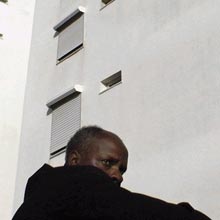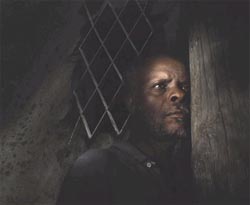Family Man: 2007 San Francisco International Film Festival (Part 2)
 |
"When they give us white rooms, we'll stop seeing these things."
-- Ventura, Colossal Youth
Sometimes I find that the more I get into a film, the less notes I take while I'm watching it -- I'm just caught up in the experience. And then there's a film like Colossal Youth, which is mundo colossal in its runtime (over two and a half hours), and I find I have pages and pages of scribbles that desperately try to make sense of what was onscreen. I saw this one in the early afternoon, and good thing too, because we probably wouldn't have made it through otherwise. "Endurance test" might not be the right phrase, but it's close.
This is apparently the third in a trilogy of movies that take place in a run-down housing district in Lisbon, where society's unwanted and refugees from Cape Verde hang out. All the "actors" are real people, and their stories are real, but this isn't a documentary -- it's more like a collection of random scenes from their daily lives as the world around them changes. Mostly the focus is on an older man named Ventura who ambles back and forth between the tenements and the new, clean, sterile projects the residents are being moved into. Ventura plays "father" to the motley crew who populate the slum, and nearly every scene is organized the same way: Ventura pops in on an old friend, the friend updates Ventura on his or her life with a lengthy monologue that somehow walks the line between naturalistic conversation and stagey soliloquy, further pleasantries are exchanged, and at a seemingly arbitrary point, the scene ends.
Sometimes the scenes take on a theatrical intensity -- a striking nighttime tableau at the film's beginning sees Ventura's wife leaving him, and the camera lingers on the enraged woman, holding up a kitchen knife to fend off the unseen Ventura, her complaints about his unsuitability as a man reverberating like a litany. Other memorable bits involve Vanda, a woman who's recovering from drug addiction and trying to raise her daughter Bete, and a younger worker who's forever composing/reciting a love letter to his estranged wife that morphs with each recitation.
 |
I saw this movie at the Sundance Kabuki, and in a weird little bit of synchronicity, I could hear construction crews sawing and hammering away in the next theater while this film unfolded -- for a long time I thought the noises were coming from the movie itself. It seems fitting, since this is a film about lives in construction, or demolition, a workbook kind of story.


0 Comments:
Post a Comment
<< Home